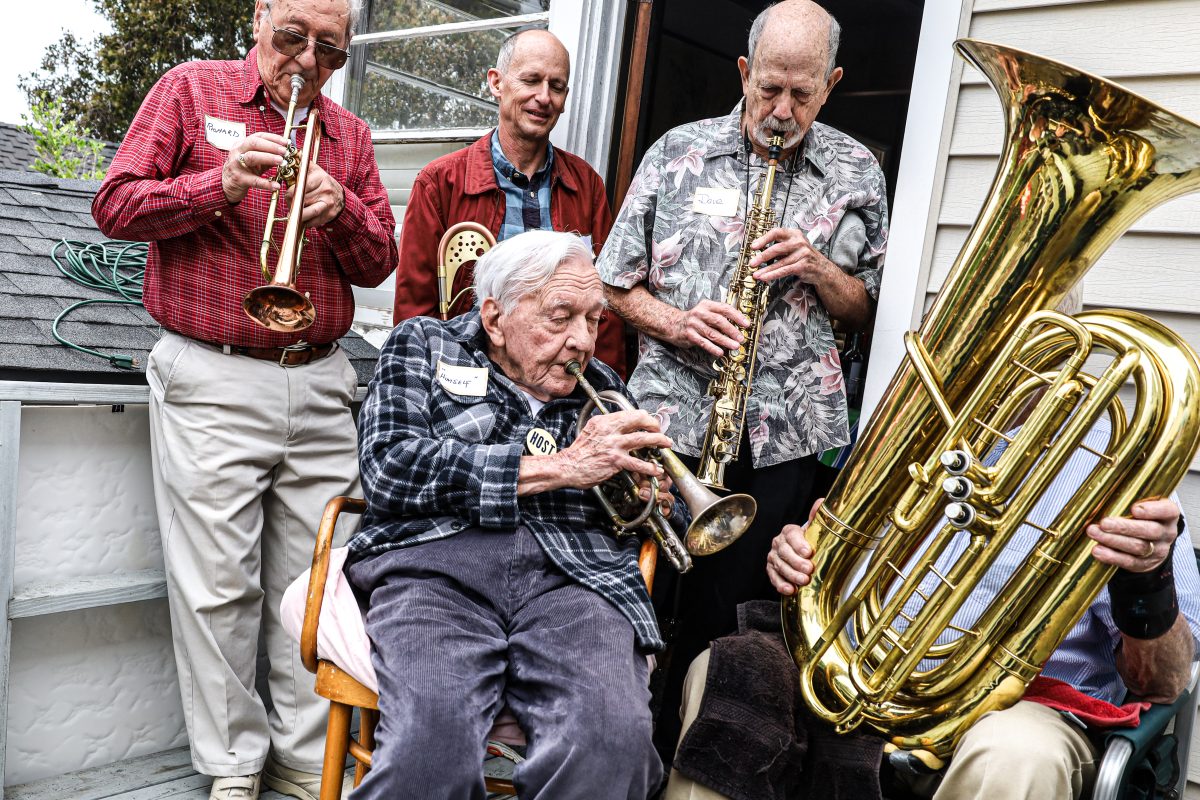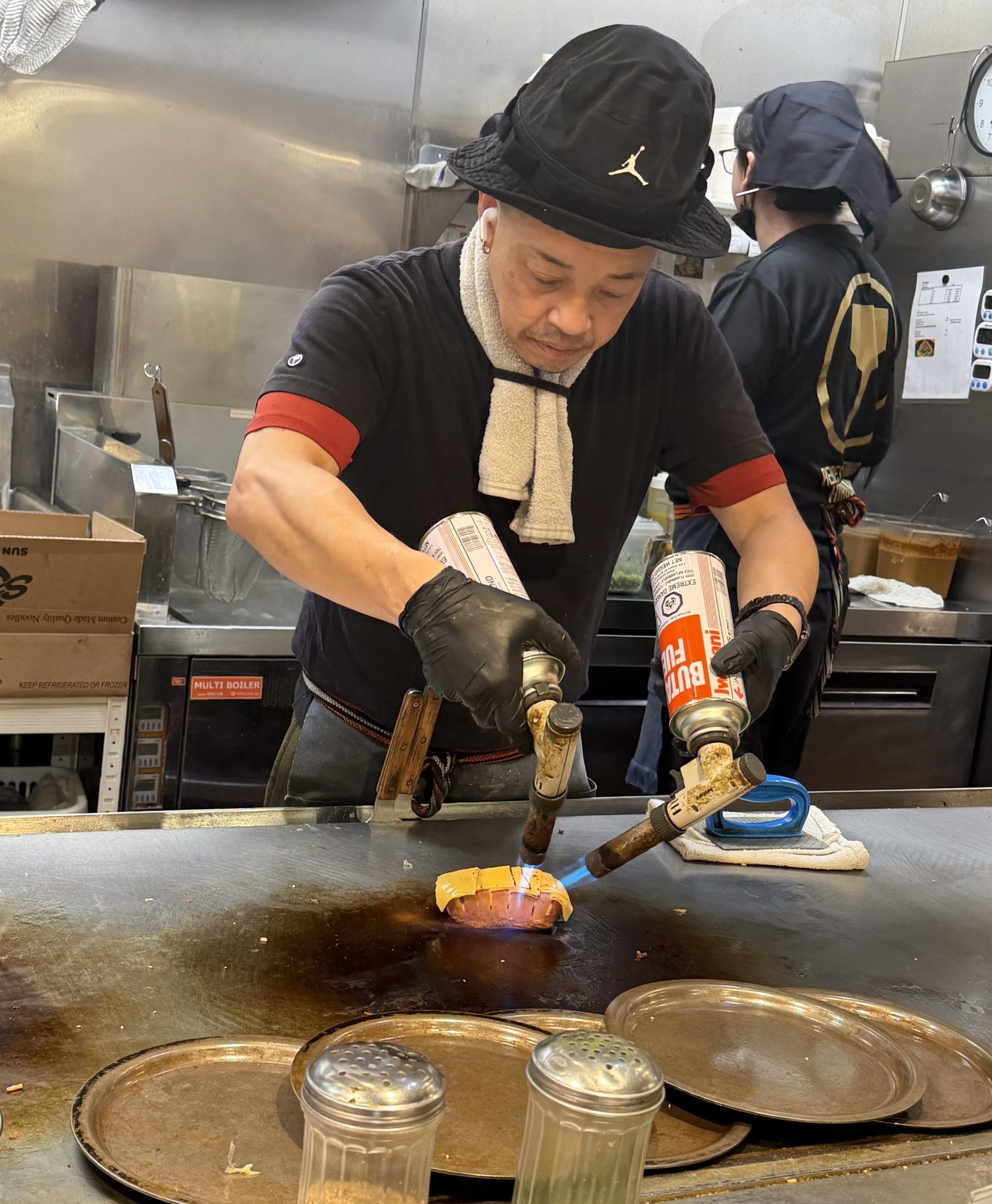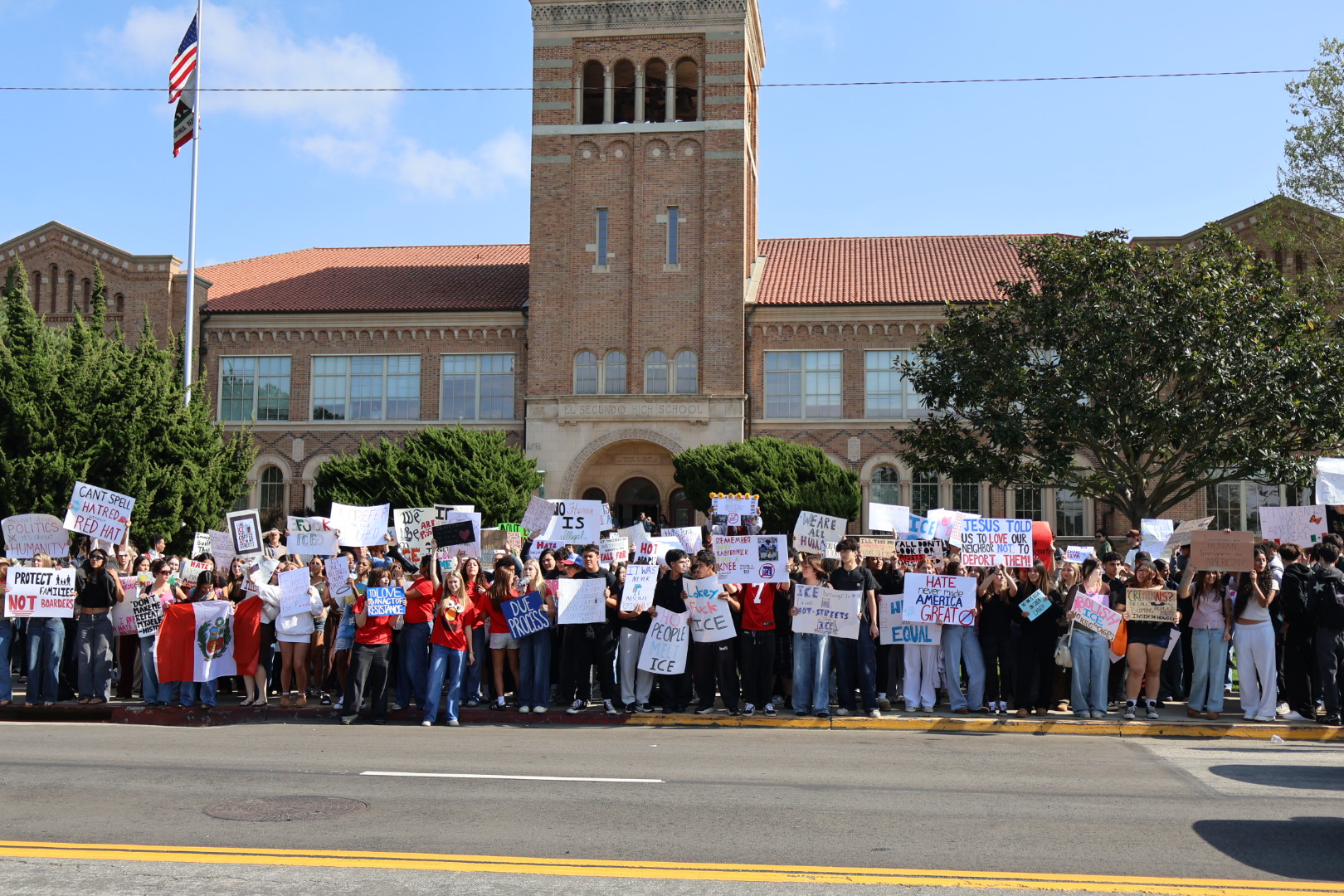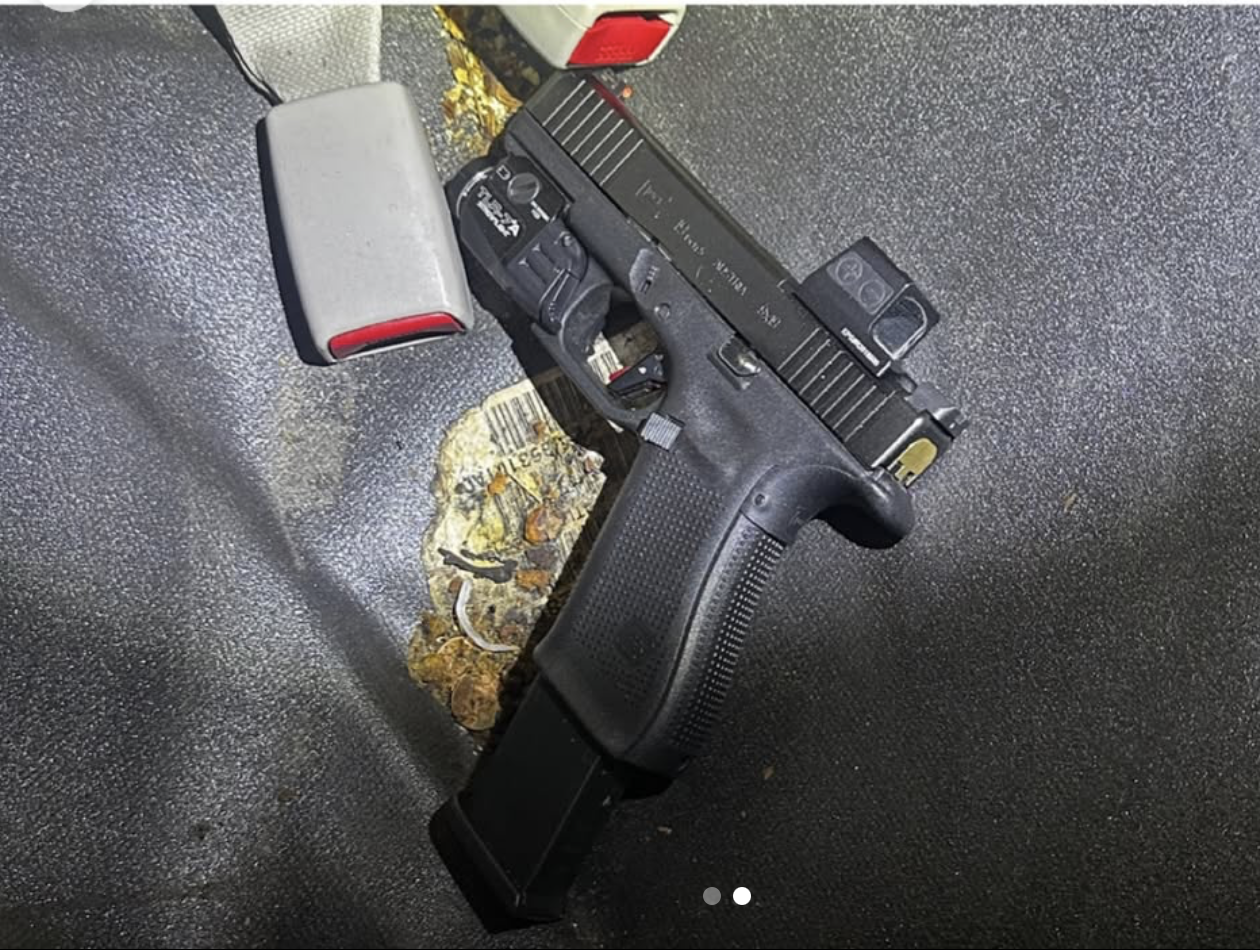by Mark McDermott
At the beginning of Tuesday night’s City Council meeting, Mayor Amy Howorth recalled the moment she first heard the official band of Manhattan Beach.
Twenty-eight years ago, the Howorth family had newly arrived in town. It was a Saturday morning in October, and Howorth was exhausted. She and her husband and two very young children had spent the week moving, and were finally enjoying a morning of calm when suddenly the distinctive blare of Dixieland jazz horns rattled through the house.
“My husband could actually sleep in because it was a weekend. He didn’t need to commute, or whatever,” Howorth recalled. “And all of a sudden we hear this Dixieland jazz out our back window, and I’m like, ‘Honey, what the…is going on?’ And not only that, but we see hundreds of people walking through our alley. And I’m thinking, ‘We have moved into the Children of the Corn town.’ All of a sudden, there’s this music, and there’s this trombone and a clarinet and a saxophone. ‘What is happening? Are we being summoned?’”
The answer was yes, but merrily so. What was going on was the Manhattan Beach 10k, which by tradition was being kicked off by the Hyperion Outfall Serenaders, who by that point were 22 years into their exuberant tenure as the City’s official band. As Howorth would soon discover, much like an official bird, the Serenaders were seemingly omnipresent in Manhattan Beach — their music sang at seemingly every event, big or small, across five decades, from the downtown holiday tree lighting festivities to Concerts in the Park, from end of the pier at the finish of the Catalina Classic paddleboard race to the Little League Opening Day Parade or the “Do Dah Parade” the band led to mimic the Rose Parade.

Though their horns have fallen silent, the legend of the Hyperion Outfall Serenaders lives on. On Tuesday night, the City Council recognized the 50th anniversary of the day the famously whimsical but seriously beloved Serenaders became, by ceremonial proclamation, the official band of Manhattan Beach.

Howorth spoke longingly of the ongoing celebration that was the Hyperion Outfall Serenaders, even on early Saturday mornings.
“Now, I have a fond, fond place in my heart for those days when that happened,” she said. “I really do connect with the Hyperion Outfall Serenaders…This is my definition of what it means to live in Manhattan Beach.”
Bandleader and trumpeter Bob White was not able to be at the meeting. He turned 98 on Monday — for which he also received a special commendation from the City — and, as the jazz song goes, doesn’t get around much anymore. But his son, Lincoln White, spoke on behalf of his dad and the merry band he led. The council chambers were packed with their fans, followers, and even a few “Do Dah” parade veterans.
“The funny story is, Mayor, that 45 minutes before they woke you up, they were in our house, waking us up, drinking beer, already getting going at 6:30 a.m. So I know what that’s like. I was surprised to find out that this is the day [of the official proclamation 50 years ago]. I think that’s really kind of poignant. And my father is the one person who would love this moment more than anybody — the crowd, the people that our family knows who are in these chambers. It’s everybody.”

The band existed before they even dreamed of being anything remotely official. It began, of course, as a lark.
Bob White had played trumpet since he was 8 years old, according to his son, “glomming on” to the sounds of Dixieland jazz while growing up in St. Louis, Missouri. He attended Iowa State University and was working in sales for Allen-Bradley in Milwaukee, Wisconsin when he was transferred to the LA area in 1956. He soon discovered Manhattan Beach and not long after met his wife, Connie, on a flight to Hawaii (aboard which she was a stewardess and he was a clumsy passenger who’d spilled a drink).
White had put down his horn for nearly 15 years when he picked it up again not long after arriving in California. Then, one day in 1969, he gave his first public performance — not that anyone was asking for it at the time, but rather out of whimsy, as was much of what he did.
“My dad met a man named Sid Pattison when he first moved here, and Sid was a clarinetist, and they jammed together from time to time,” Lincoln White said. “Then my dad and both my mother and Sid’s wife were employees of LAX, so it was kind of a second home to us all. My dad and Sid and then another man named Dale Van Scoyk, who was a trombonist — they started going out to the airport whenever they knew somebody was coming in on a flight, and they would play, ‘California Here I Come’ for their visiting guests, and invariably, somebody in the terminal would offer them money to come play for grandma or their wife coming in on a plane or something like that. And that really was the genesis of that trio.”
They played together as a trio over the next few years.
“That was as early as 1970 and 1971 that was going on, then, over time, they just kind of injected themselves into community events,” Lincoln White said. “As a matter of fact, 2024 was the first Hometown Fair ever that my Dad’s band did not play.”
The Hometown Fair was founded in 1972. Bob White in an Easy Reader interview in 2010, reckoned the band came fully together a few years later. First came a banjo player, Don Rychman. A tuba player was soon to follow, and all the trouble that would entail.
The exact timing is a bit hazy.
“The present band started in about 1974, 1975,” said White, “but we’ve had a little band going since 1970, which was the primordial beginnings of the Hyperion Outfall Serenaders.”
Their repertoire reached back to the early part of last century, and a little beyond. As musician and journalist Tom Fitt wrote in his Easy Reader on the band in 2010, “The songs performed by Outfall (as group trombonist Jack Freeman calls the band) are old and it takes a mature musician to recognize the melodies and harmonies of these classic gems, most of them written before present band and audience members were born. ‘Darktown Strutters Ball’ (1917), ‘St. Louis Blues’ (1914), ‘Basin Street Blues’ (1926), and “When the Saints Go Marching In’ (1896) are some of these cherries.”
Lincoln White said his Dad’s love for Dixieland Jazz has been a lifelong affair.
“That’s just his little genre that he glommed onto,” White said. “He was a big band kind of guy back in the day. Glenn Miller and all that stuff, that was his era. This was pre-Sinatra and pre-Elvis, and that’s where he locked in and never left throughout the rest of his life. I think Dixieland offered a chance to have a small group and a small type of music. You can get away with just a clarinet, a trumpet, and a trombone, and you could play some Dixieland.”
It was also a music that didn’t take itself, or life, too seriously. Bob White always had a sparkle in his eye, and so both the music and the band he founded were in keeping with his mischievous ethos.
“The band name itself is a name with a sparkle inside, because they named themselves after a sewage treatment plant,” Lincoln White said. “That’s his self-deprecating attitude. They did put out a couple albums, and the first one was called ‘Clam Dip,’ because it’s another term for a sour note. If you play a sour note, it’s a clam, so their album was called ‘Clam Dip.’”
In 1975, a good friend of White’s, Joan Dontanville, became mayor. White, naturally, currying political favor from his friend, hatched a plan.
“Somehow he coerced her to to name the Hyperion Outfall Serenaders the the official band of Manhattan Beach,” his son said.
White still has the weathered proclamation from March 18, 1975. Although the band was a local staple, they did tour a little bit. They were a fixture back in the heyday of the 70s at the Roller Derby at the Grand Olympic Auditorium in LA (where MBPD officer Don Lastra was a referee). They played Catalina Island’s Casino Ballroom on both the 4th of July and New Year’s Eve for many years, as well as a jazz festival in Mammoth for several years.
“We’ve gone up there for the past six or seven years,” White said in 2010. “But, the festival business is getting more and more competitive and the musicians are getting so good that a band like ours… well… My statement is that we’re good enough to play in a festival, but we’re not good enough to be invited.”
The Do Dah parade was another tradition that began on a lark and persisted for decades.
“It was a takeoff on the Rose Parade and originally would happen right after, then they moved it to just after Thanksgiving,” Lincoln White said. “It was just goofy groups of people that did silly kind of mawkish parade entries. And my father, for his, year after year he would get a flatbed, and people would be pullers, and the pullers were dressed up as guys in togas. He always picked a king and a queen. He put a keg on the float. He put an outhouse on the float. And they always met at Ercs for a couple drinks, and then the bus showed up and took them all out to Pasadena, and ran along the same route as the Rose Parade.”
In the beginning, the band played for beer and sandwiches, but eventually White would have to hire occasional professional players and so some gigs became paying ones. The band included a rotating cast of characters but had a good quarter century with a core group of nine players. At that time of the 2010 interview, that included White, Jack Freeman, Fran Freeman (Jack’s wife, on washboard, which is a typical Dixieland percussion instrument), Jimmy Green (banjo), Pete Kier (tuba) and Rod Norris (clarinet), who was 94 at the time. The band’s regular tuba player for many years was Jack’s brother, Dave Freeman. Other longtime members included clarinetist Bill Lamden, trumpeter and singer Jules Radinsky, and drummers John Malone and Louis Pastor.

Trombonist Jack Freeman, who joined in 1976, said in 2010 that the Outfall Serenaders had become something more than a band. “I realized that the Outfall was a way of life – and it certainly has been,” Freeman said. “We used to play at least two gigs a week… I realized that if I got in that all by myself it would not be too popular. So, I got Fran in right away. And I knew they needed a tuba player, so I involved my brother Dave. Bob White used to play both tuba and cornet – he’d switch back and forth.”
“I’m actually the second trombone player the band has suffered through,” Freeman said. “I used to give Bob a hard time, as soon as I came in. Bob would say, ‘Geez, another trombone player that’s giving me hell all the time.’ I upheld the tradition of bone players.”
White did write a few of his own tunes, such as “Home in Manhattan,” about the changes he’d witnessed in his adopted hometown. He sang it scat-like, “in his cigar-cured voice, like fellow trumpeter Louis Armstrong” the Easy Reader noted in an article celebrating White’s 95th birthday.
Oh my, Manhattan
What the heck has happened
They’re tearing down the whole darn town
And building castles,
The dirty rascals
My neighbor is a yuppie
Who built a house so tall
It blocks my view
What can I do
You can’t fight City Hall

White’s last performance was at the start of the 2023 Manhattan Beach 10k. “I got my Dad out there early that morning,” Lincoln White said. “He dressed up and sat with the band. The next day, the band played [at the Hometown Fair] without him at the Jocelyn Center.”
And that will likely remain the final performance of the Hyperion Outfall Serenaders. But on Tuesday night, after the City Council meeting, eight surviving members of the original Do Dah parade reconvened at Ercoles.
Bob White wasn’t there, but the sparkle in his eyes was. Their horns may not have sounded, but somehow, some way, the band played on. ER









The Serenaders have a place in our hearts as they were the band at my wedding back in 92. It was great fun and the best way that us two MB kids could have partied that day.